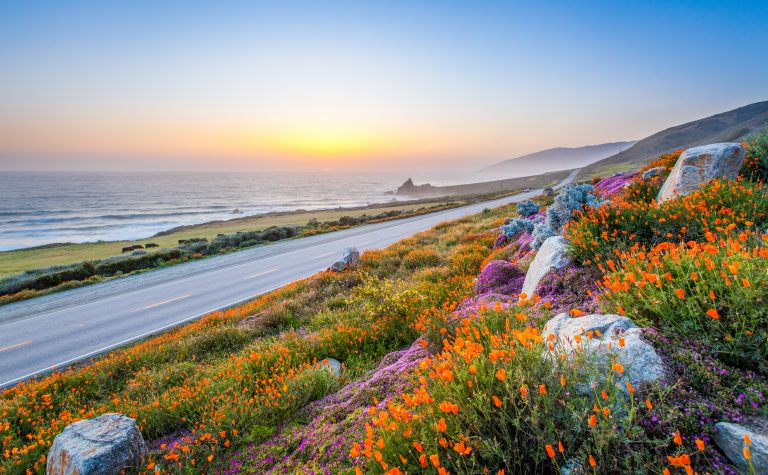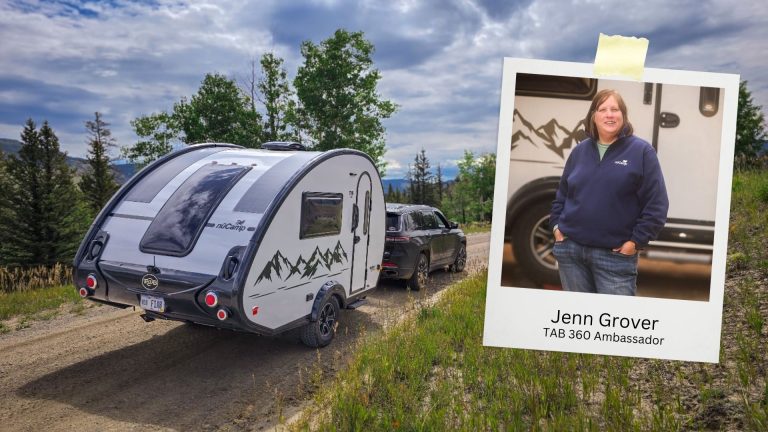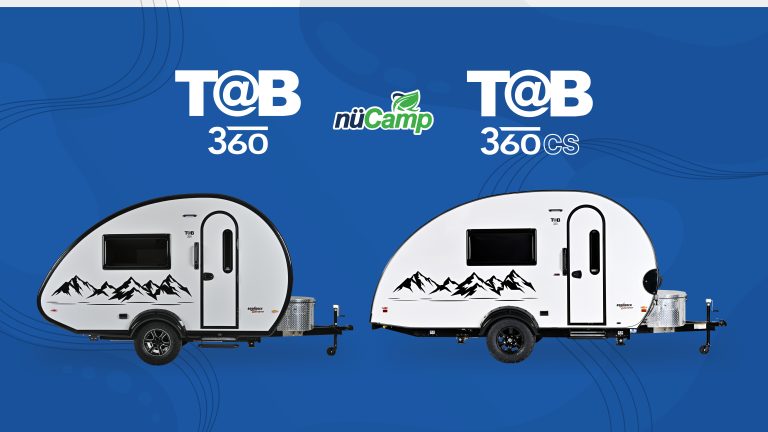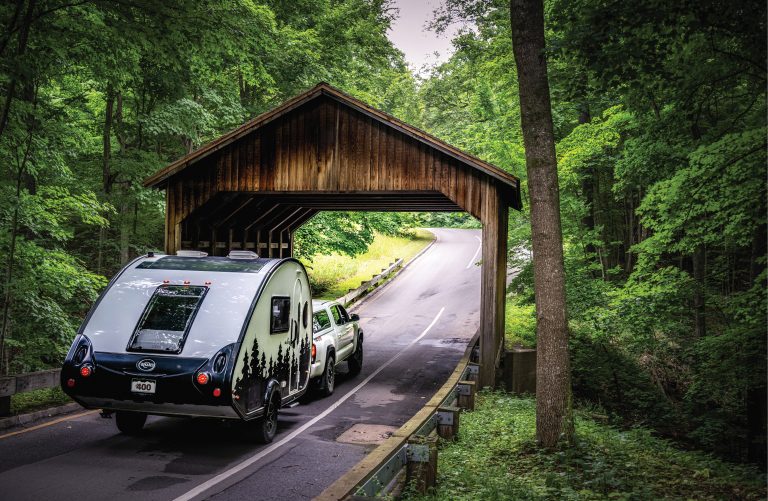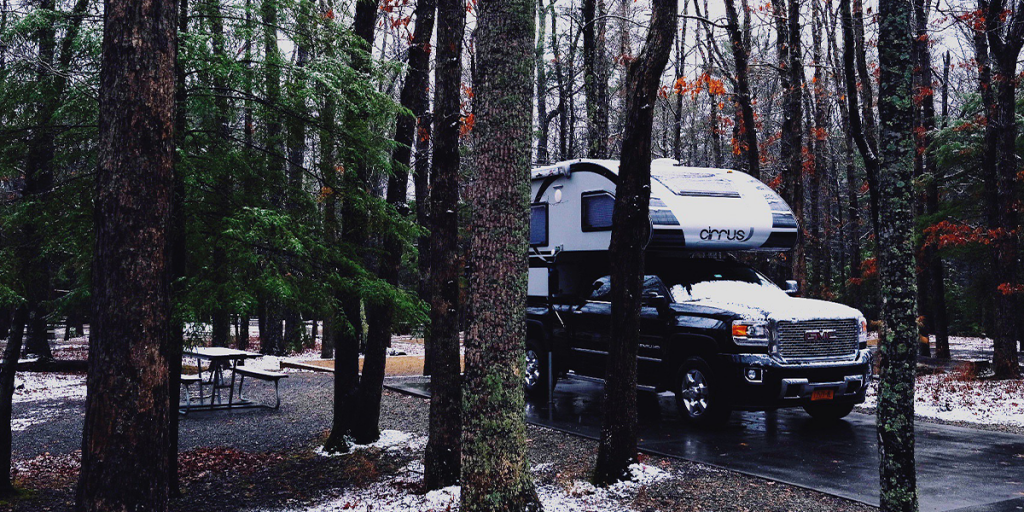Winter Camping Tips for RVers from Lonnie and Guntars Asmanis-Graham
Lonnie and Guntars Asmanis-Graham have been hitting the road in their 2017 Cirrus 820 for more than two years, which means they’ve been doing more than a bit of driving in winter conditions. We reached out to them for some tips on RV-ing in colder temps: what to know and do to enjoy the weather while staying comfy-cozy! Here is what the couple shared about RV-ing in the winter.
Winter Camping Tips for RVers from Lonnie and Guntars Asmanis-Graham
In our opinion, winter is the best time to go camping. It reminds us of all of the reasons why we wanted to live full-time in an RV: the rejuvenating slowdown in pace, the quiet solitude of life away from it all, and the ability to immerse yourself in the beauty of nature. Winter boasts that peaceful feeling that comes with shorter days and cozier nights. It’s the time to enjoy those rare little moments, curled up with a hot cup of tea and a good book, watching the snow fall.
However, winter camping in an RV definitely requires a lot of preparation and diligence. Here are some of our best tips and tricks that have helped us have a great time in the colder months.
Cold-Weather Comfort
If your RV boasts that it is built for the “four seasons,” make sure that it is! Some RVs claim to be capable of low temperatures but fail in reality. To be truly four-season ready, your camper must, most importantly, be well insulated. This one factor will help keep condensation to a minimum, prevent your heater from running too often—saving power and fuel—and will keep the sensitive components of your RV safe from freezing temperatures.
We love that the holding tanks and plumbing in our Cirrus 820 are behind the insulation and exposed to the heated air inside, preventing them from freezing. Other features to look for in cold-weather-ready rigs are: double-paned windows, an enclosed and heated underbelly, a high-powered heater (shout out to Alde for keeping us nice and toasty!), and multiple fans for ventilation.
Condensation Cautions
As mentioned above, condensation is your worst enemy in cold temperatures. It’s simple science: the cold air outside is much drier than the warm, moist air that you’re breathing inside, and that moisture will condense on the walls, ceilings, everywhere. And we all know what condensation means: mold and water damage. So, always air out your camper at night. You can do this by running your ventilation fans and/or keeping your windows cracked.
For those with truck campers, remember that the area right below the bed is open air, so the condensation will likely form under your mattress before anywhere else. To combat this, we have actually placed desiccant under our mattress. Also, make sure that your mattress has sufficient airflow under it. The Froli system that came with our Cirrus helps keep that air flowing for us.
Know the Numbers
We also recommend buying a humidity and temperature meter to keep an eye on the relative humidity and temperature going into the night. If the humidity is too high, you’ll wake up to condensation dripping on you in the morning. What’s too high will depend on the current temperature, so just keep on eye on these numbers and note them when you do notice condensation. Also be aware of the rise in humidity when you’re cooking! Boiling pasta will definitely require some open windows.
Boondocking and Batteries
Always prep for how you’re going to keep your batteries charged under the cloudy skies that come with winter. If you predominately boondock like we do, you’ll find it difficult to rely solely on solar power in winter. Our panels charge a little, even up to 20Ah, but we’ve had to purchase a generator for days when we’re boondocking and the sun is nowhere to be found.
You can also opt to stay at a state park or a private campground that provides an electrical hookup if you don’t want to carry a generator or worry about solar charging.
Countering the Chill
Cold weather can wreak havoc with your water lines and propane supply. If you are connected to a water supply and/or sewer while camped and freezing temperatures are expected, make sure to disconnect so your lines don’t freeze!
Also keep in mind that your propane tank’s pressure will drop the colder it gets and this means your propane supply may no longer work when it’s chilly. This might mean insulating your tanks if they are outside. The smaller your tanks, the more dramatic the effect is. We’ve had this happen with our 20-lb tanks when camping in below-freezing temperatures.
It’s pretty much a lesson in physics. The propane is a compressed liquid in the tanks and when it is released from the tanks, it turns into a gas, which is the state that runs things like the stove, the heater, the fridge, etc. However, the colder it is outside, the slower the liquid propane will evaporate into this useful gas. This is because the propane itself needs heat as energy to turn into gas as it is released. As the temperature outside drops, the liquid no longer has enough heat energy to turn into gas at the rate at which the appliances need it. It will eventually reach a point where the gas is just trickling in, rendering it useless.
We didn’t insulate the tanks or compartment because they will themselves freeze when used, since, when they draw the compressed liquid out, they are also drawing out heat. If anything, the tanks need to be exposed to warm air. We aren’t comfortable messing with anything surrounding the tanks, so we’ve just dealt with the cold nights!
Sweep the Snow
Winter means snow. We love snow and the beauty that comes with it, but it will require some special attention as an RV-er. Make sure you have a sturdy snow/ice brush to clear your camper after a snow. Pay attention to your solar panels! You’ll want those to be totally clear of snow to catch as many rays as possible. You also generally don’t want snow just hanging out on your camper, causing extra wear and tear on your protective finishes and seals.
Plan for Possibilities
Always plan ahead when setting off in your RV, but this is especially necessary when expecting inclement weather. You never know what kind of conditions you’re going to hit while on the road. Have all of your emergency supplies stocked and ready to go if necessary. Also give yourself plenty of extra time to get to your destination so that you can take your time on slippery roads or pull-over if necessary.
When planning where you’re going to stay the night, make sure that the campground and roads to it are open! Some campgrounds close for the winter season while others may stay open but with limited to zero facilities and amenities. Always call ahead to know what to expect before you arrive.
(Be sure to check out Lonnie and Guntars’s Instagram page and YouTube videos.)
Recent Articles
